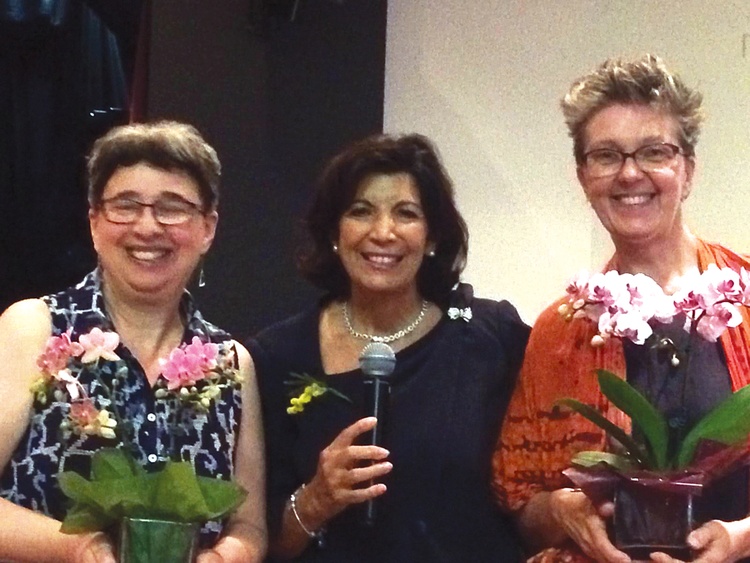The guest of honour was Italo-Australian journalist Anna Maria Dell’oso.
The idea for the conference was born from an interesting book called Growing Up Italian in Australia, which was published 30 years ago by the Associazione Nazionale Donne Italo-Australiane.
The book includes a beautiful introduction by then-president Franca Arena, who was also present at the conference, and is a collection of stories by 11 young women, all who were children of Italians, who recount with moving authenticity the joys and pains of their dual existence.
Today, 30 years later, we invited Dell’oso, one of the authors of the book, to speak on how and how much her Italian heritage influenced her personal and professional life.
Dell’oso is a noted journalist for her collaboration of 28 years with Sydney Morning Herald, as well as an appreciated writer of many successful books, including Songs of the Suitcase (Harper Collins) and Cats, Cradles & Chamomile Tea, plus two recent short stories called Local Spirits and Return of the Rings, published on Griffith Review.
Assisted by photos of her family (who were originally from Abruzzo), images of places, anecdotes, episodes and fragments of memories from the beginnings of her journalistic career, Dell’oso reconstructed, with incisiveness and wit, the fundamental moments of her formation, of the conflicts between two identities and the reconciliation with her origins, which was the fruit of a process which was undertaken in her later years.
And, like a circle that closes, three children later arrived who spontaneously drew closer to the Italian language and culture, feeling it as their own.
Bianca Bonino brilliantly read some excerpts from the short story The Sewing Machine, in which Dell’oso confesses: “I definitely felt excluded in the dynamics of the courtyard games at school, in the precarious balance between groups which had never accepted me and groups which had refused me.”
“Certainly, I could have stayed with others like me, children with dark eyes who brought food cooked in olive oil and wrapped up in butchers paper,” she continues.
“It shames me to say it but I was not able to see the advantages of sticking with other Italian children.
“We felt embarrassed... We didn’t like looking each other in the eyes, and seeing ourselves reflected as we were: strange, unadapted, wogs.”
Dell’oso’s speech was followed by a lively debate.
Although in different form and dimensions, both Pina Lombardo and Rita Picone DiGiovanni admitted that since adolescence they felt like they “belonged” in Australia, although understanding to be part of another culture.
Maria Tripolone confirmed her frustration in feeling different from everyone at school.
Only to discover recently that her “Australian” friends had never even noticed this difference and today she wonders whether those feelings of exclusion were only the fruit of a sense of inferiority, inevitable for those who belong to a minority.
Rose Genovese admitted that, although she was never a first person victim of discrimination and prejudices, she felt quite humiliated by her own culture.
The broken English of her parents made her embarrassed, especially when she was required to play the interpreter in delicate situations, such as during medical visits or when handling administrative procedures.
Genovese today regrets those feelings.
“Our parents suffered so much,” she said, adding that their tenacity was limitless,” she said.
“Just for this they merit total respect and love from us.”
The conference aimed to pay homage to a “generation in the middle”, who were tormented by the necessity to create a bridge between the two cultures, the Anglo-Saxonic culture, which was too indulgent in the eyes of the parents, and the Italian, which was anachronistic and impregnated by stereotypes.
From this situation was born the refusal to speak Italian, to eat panini with salami or invite friends home from school, embaressed by the “woggy” style of furniture and the tomatoes and eggplants in the garden, instead of roses and hydrangeas.
In the most extreme cases, a sense of inadequacy brought this generation to camouflage their origins, reverting to little tricks such as dying their hair, anglicising their names and making themselves “uniform” outside of the house, thus behaving in a way that would be considered inappropriate in the family sphere.
As identified by Arena, those youth had the option to “ignore their origins, and their cultural patrimony, but to hate their origins would have been like hating themselves”.
Arena concluded with a positive message: this generation, with time, learned to love and understand Australia.
During the process, they changed Australia and were in turn changed by it.












